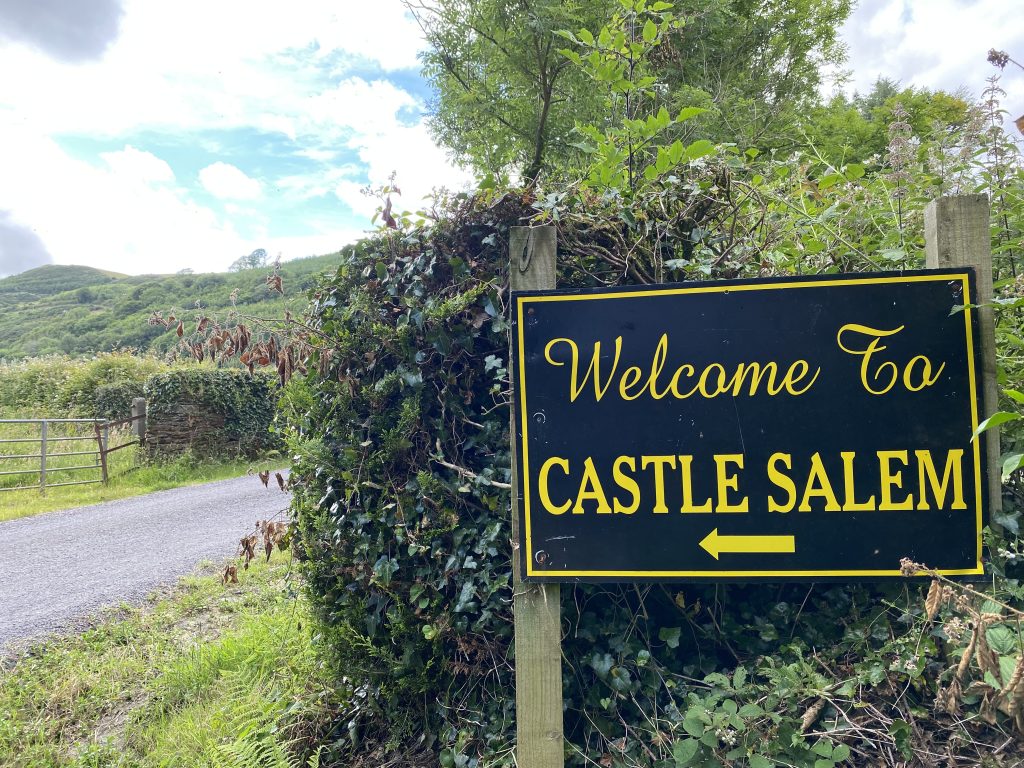In the summer of 2003, I got drunk for the first time and met one of the most beautiful women I will ever know. It’s time to tell that bittersweet story.
An Irish Adventure
That summer, my friend Matthew and I traveled to Rosscarbery, a small town on the southern coast of Ireland. It’s just as picturesque as it sounds. Ross has a stunning ocean lagoon, rolling hills, country pubs, and a Christian cathedral with roots dating back 1500 years.
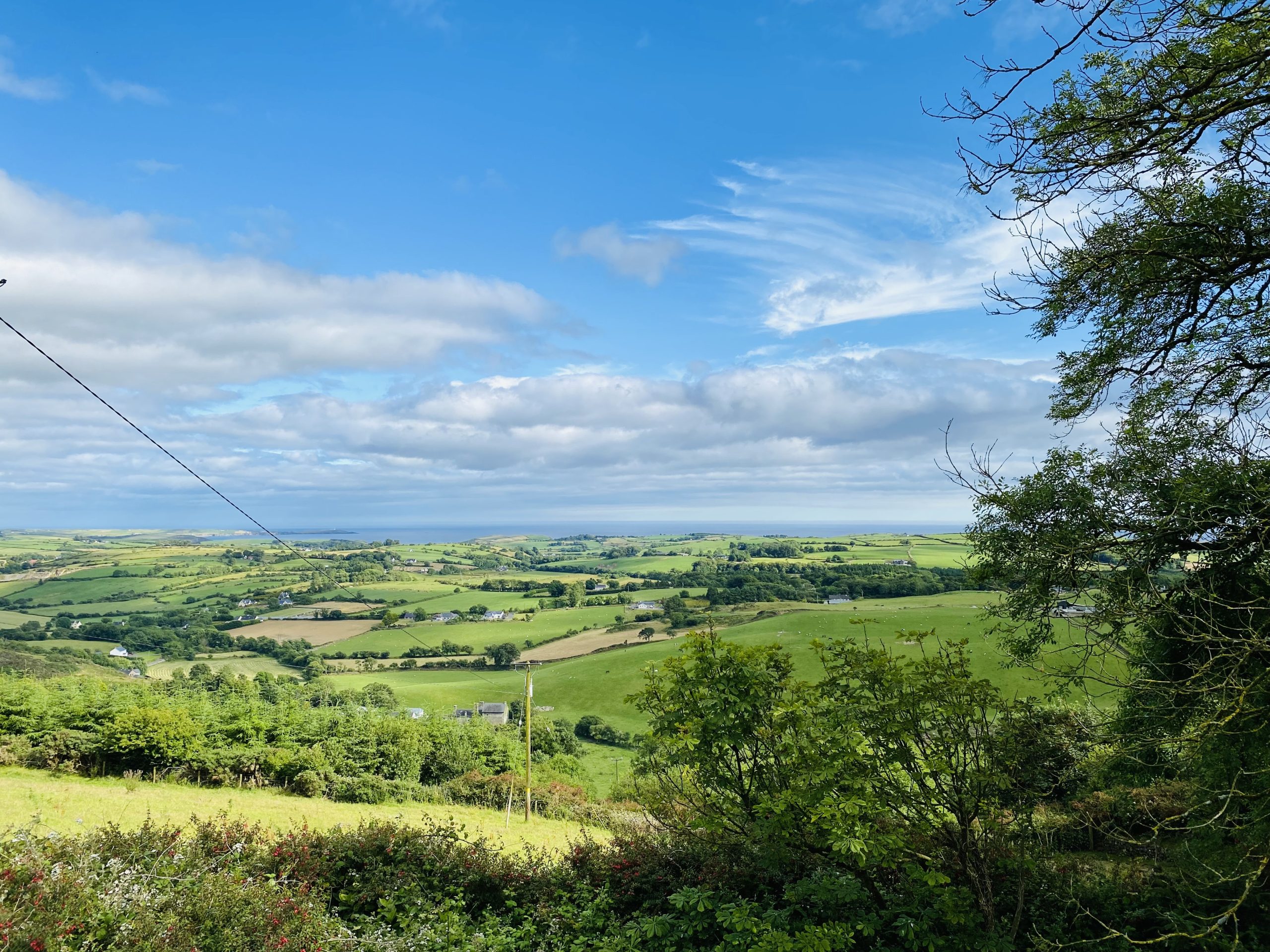
The view overlooking Rosscarbery
We moved in with the Daly family who lived in a 17th-century farmhouse attached to the historic 15th-century Castle Salem.
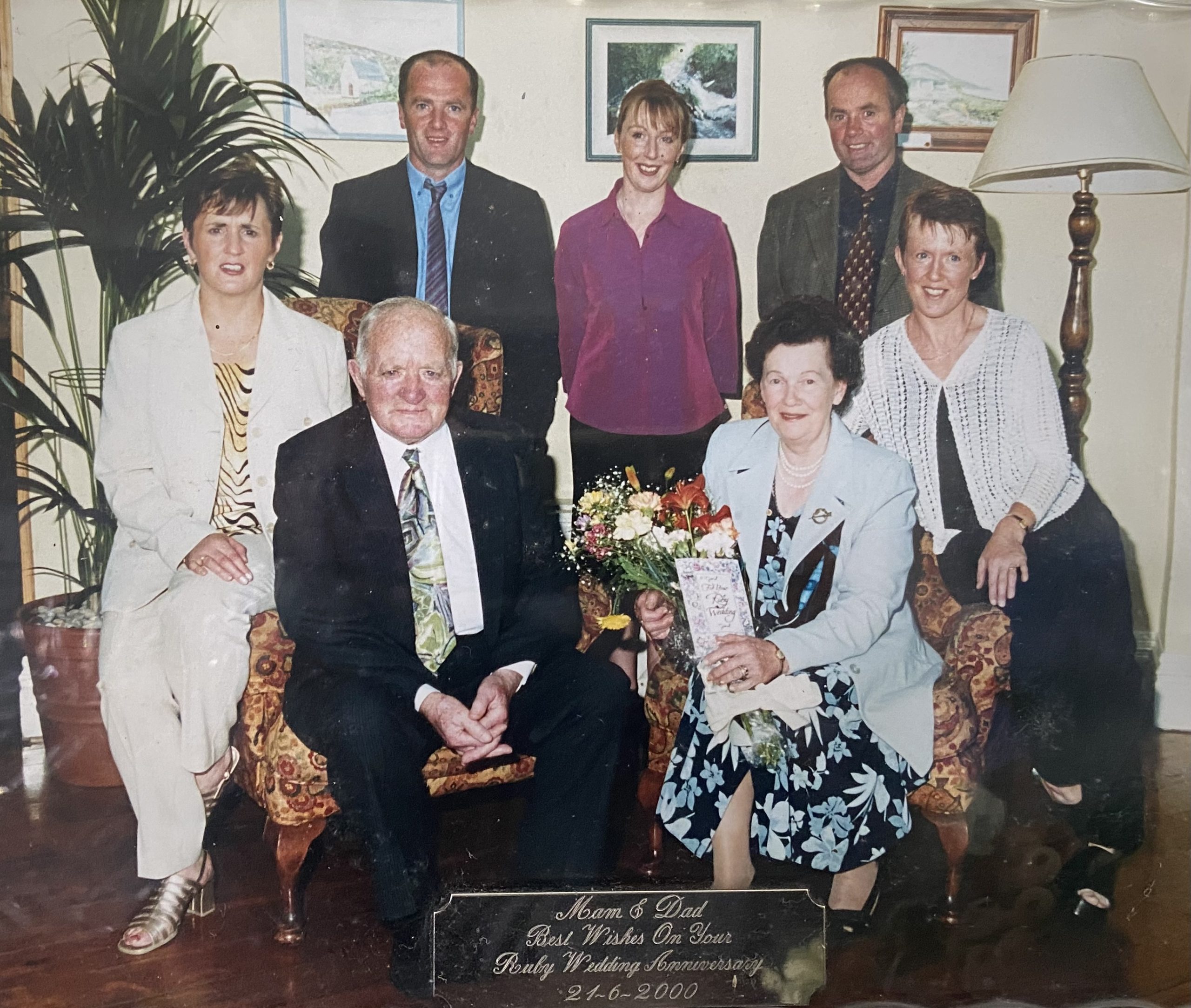
Michael and Margaret Daly (front) with their children in 2000
The Dalys raised horses, farmed fields, worked with stone, and ran a bed and breakfast in their beautiful, yellow home. Matthew and I went there to write our first book, which we did. We stayed in William Penn’s room, the bedroom where the founder of Pennsylvania and a nonviolent Quaker lodged when he visited this house back in the 1600s.
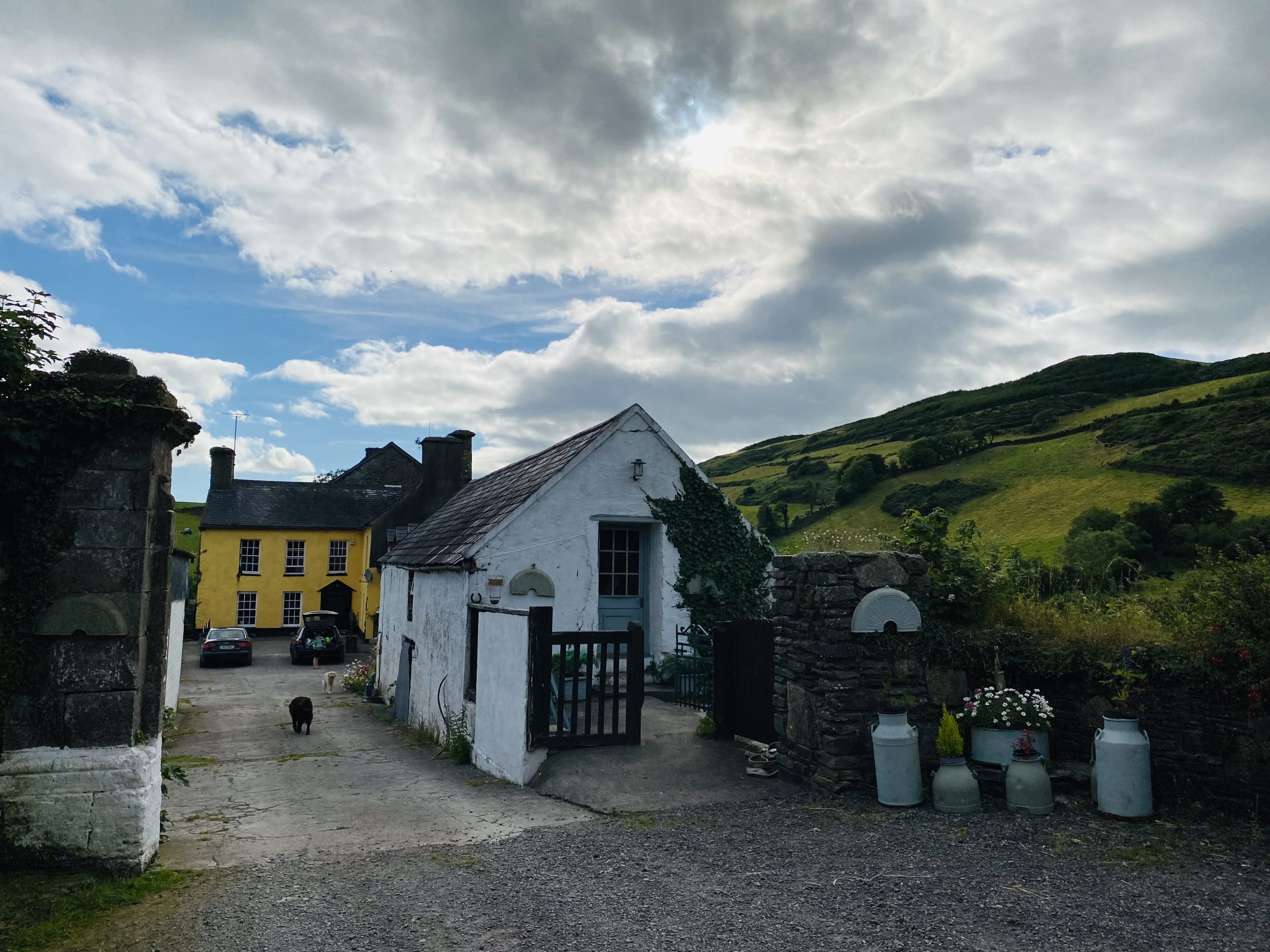
Castle Salem; the actual castle is behind the yellow house
I will never forget the bus ride south from Dublin through Ireland’s lush countryside to Castle Salem. My stomach sunk lower and lower with each mile. I was afraid that we had made a terrible mistake — that our summer in rural Ireland would be isolated, boring, and lacking the inspiration we needed for our book. At the time, I was twenty years old and wanted to be in a buzzing city. This was the opposite of that.
But there is often sacred joy hidden in being wrong.
Cead Mile Failte
Mrs Daly welcomed us into her historic home tucked in the patchwork hills just above the Atlantic Ocean. She greeted us warmly with the Irish words, “Cead Mile Failte!” — a hundred thousand welcomes. And then, day after day, for the next two months, she embodied each of those welcomes.
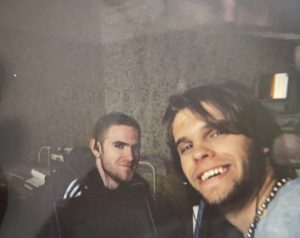
Writing in William Penn’s room
Before we started writing, she would serve us a delicious Irish breakfast with homemade scones and blackcurrant jam. Throughout the day, her eyes were lit with kindness as she attended to her many tasks. She ran the bed and breakfast amidst her daughter Eileen being diagnosed with terminal breast cancer and other members of her family tragically dying that summer.
We arrived as total strangers, but Mrs Daly made us part of her loving family. My fears proved false, and we couldn’t have asked for a more meaningful, beautiful, profoundly grounding place in which to write about the story of scripture and being human. Years later, I wrote to her, “The Summer of 2003 will always be a cornerstone of my life in every way — family, God, friendship, and work.”
I still feel that way now.
Sick Drunk
After the day’s work was done, Mrs Daly’s son Peter would sometimes take us out at night to the local pub, The Morris Arms. Peter was a horse trainer and a wonderfully cheerful man. These were glorious times together. Unlike a stereotypical American bar, Irish people don’t go to the pub to get drunk but to share presence, talk, and sing together. They call it “craic” or good fun.
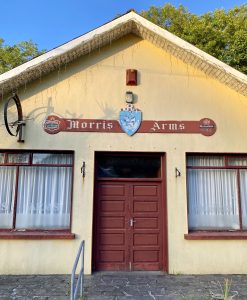
The Morris Arms closed during Covid
Long after the sun went down, it was always magical to me when a hush would fall over the dimly lit room as a man started to sing, until everyone would join into the chorus, with pipe smoke spinning through the air. It was profane and sacred all in one.
During our many nights at the pub, Matthew and I remained soundly sober. The most I could drink was a few pints of Murphy’s Stout and “a drop of Bailey’s” at the end of the night as the lads would say. Still, we were curious. Matthew and I were inexperienced with alcohol, and we assumed that we were supposed to feel something more than we were feeling.
So one night after we got home from The Morris Arms and Mr and Mrs Daly had gone to bed, we helped ourselves to their liquor cabinet in the sitting room. We took one drink and still didn’t feel any different. So we took another. And then another.
Of course, we were ignorant, and this was a terrible idea. But we learned our lesson soon enough.
Some fresh air sounded good, and we started walking down the castle’s long driveway. In the darkness of night, it was like a tunnel lined with tall trees.
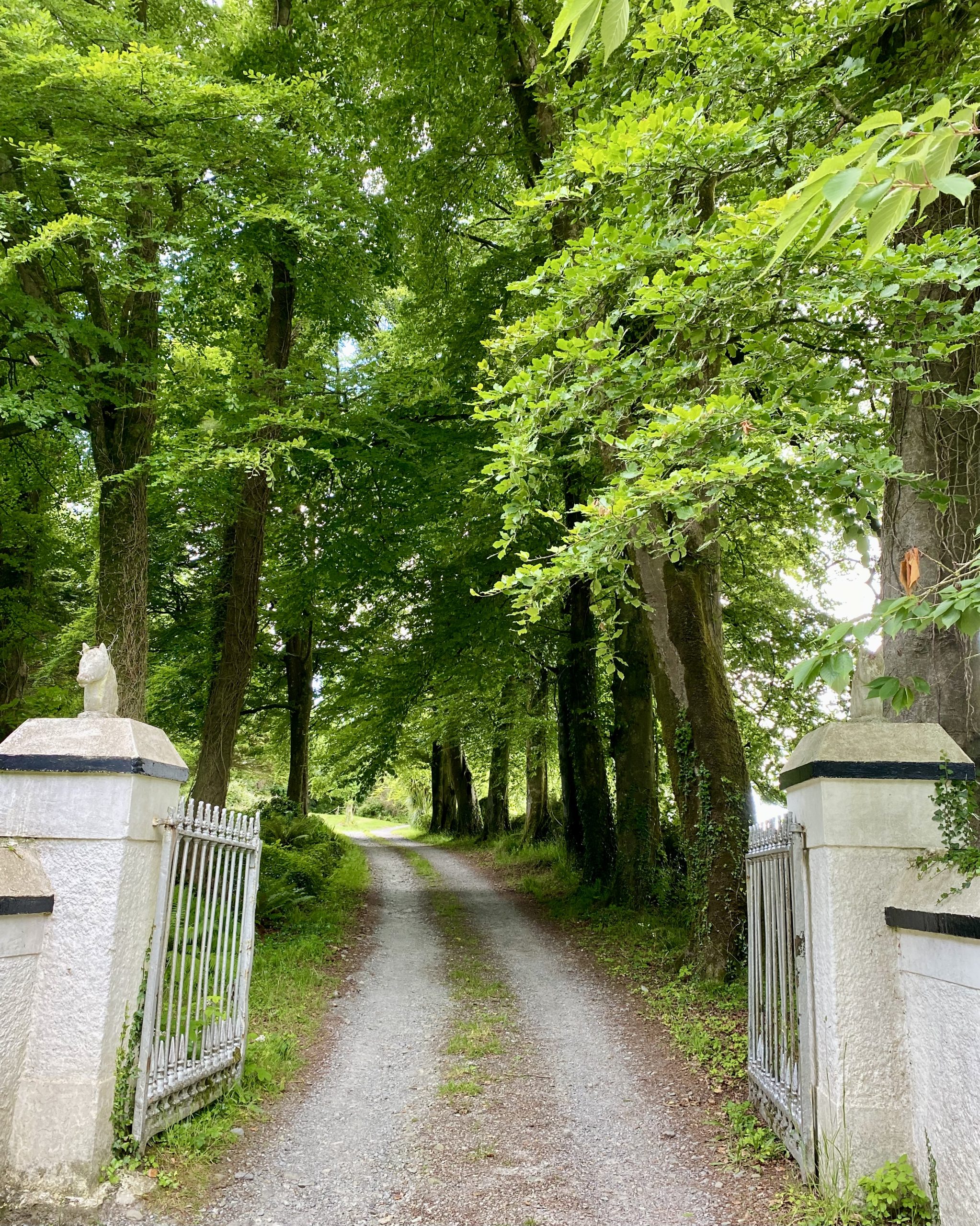
But, of course, our heads and the world within them started madly spinning like the pipe smoke in the pub. We could hardly walk and rapidly returned — stumbled — back to the house for safety.
Before long, we were vomiting outside Mrs Daly’s front door and then in William Penn’s historic bedroom. Looking back, it’s quite comical to me. But at the time, I’m not sure I’d ever been as violently sick as I was that night far from home. It was the kind of existential illness where, amidst the swirling nausea, you swear to God you’ll never do it again, if only you survive.
“My Work Is My Prayer”
We were still bedridden late the next morning. From my bed, I’ll never forget seeing Mrs Daly’s face with her short, curled hair and subtle lipstick peaking around the door into our bedroom to check on us.
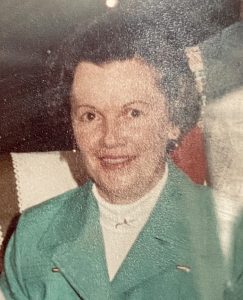
She wasn’t angry or impatient, despite us plundering her family’s liquor and then foolishly fouling her home. Instead, her face combined compassion with good humor — a bright kindness touched by our misery. She nursed us back to good health and book-writing with her porridge and plenty of Irish tea.
I will always remember Mrs Daly as one of the holiest, most beautiful women I have ever met. She endured tremendous loss and heartbreak in her life, including the deaths of two of her children, Cornelius and Eileen. And still, she lived and loved with an unmistakable trust in God and God’s goodness.
This trust didn’t primarily come through in the words she would say or visible piety, much less preaching. I never “caught her on her knees.” Instead, Mrs Daly’s faith was embodied in the quality of her presence, especially her enduring kindness. Like St Francis said, she preached the gospel always and used words when necessary.
During that summer, I asked Mrs Daly about how she maintained such a deep trust in God despite her suffering and the heavy load of her daily work. What was her spiritual practice like? She replied, “My work is my prayer.”
She meant that she welcomed the presence of God into everything she did, from cooking to cleaning to hosting guests like us and serving her Catholic community amidst joy and grief. In this practice, life wasn’t divided between the sacred and secular, the human and divine. Instead, she modeled a way of living in God’s presence as an ongoing act of openness, gratitude, service, and surrender. In the 17th century, around the time when Mrs Daly’s farmhouse was originally built, the French mystic Brother Lawrence called this “the practice of the presence of God.”
I see this integration as a mark of real spiritual maturity and holiness. And Mrs Daly embodied it with unusual authenticity and an incredibly powerful gentleness. In an email ten years later when people I dearly loved were dying, I told her, “With you I experienced such a profound sense of God’s mercy and kindness. I still never forget your saying, ‘My work is my prayer.’ I know you would object to this, but I think of you as a saint, honestly.”
A Long-Anticipated Reunion
Starting in 2007, I wrote emails to Mrs Daly about an Ethiopian woman I was getting to know in Addis Ababa. Three years later, Lily and I would get married there. I told both of them that I dreamed about them meeting one day, though it was hard to imagine that ever being possible.
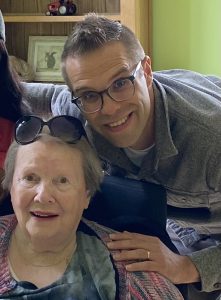
Eighteen years later, by God’s mercy, that meeting finally happened. On August 14th at Clonakilty Community Hospital, Lily and I made our journey to visit Mrs Daly. She had recently turned 89.
She was incredibly sharp, and her eyes shined with the same loving kindness I remembered so vividly. A devout Catholic, she began by telling us a wry joke about the Vatican. Perhaps another mark of spiritual maturity is the ability to laugh at your own religion. We also laughed heartily remembering our drunken disaster 22 years before. Then Mrs Daly sang in Irish and English for Lily after commenting on the beauty of her eyes — “In your eyes there’s a view of Killarney.”
Between songs, we laughed joyfully together again.
The Wonderful Thing on Earth
Mrs Daly also told us about her faith. She said that at this season in her life, she was meditating on the verse about the crucified messiah: “The stone the builders rejected has become the cornerstone” – “the one that keeps them all together,” she added. Remembering her own suffering, she confessed, “I pray for courage — you know Eileen passed away.” She then added, “We’ll all be called up in heaven.” I told her sincerely, “You are one of the angels here on earth.”
To this she started talking about “St Michael the Archangel” and said, “Lily is gorgeous.” She then asked, “Do you know the eleventh commandment?” We admitted we didn’t, and she replied, “Man, mind thyself.” Naturally, she illustrated this work of self-awareness with her experience of carefully leaning out windows at the castle and washing the outside panes.
I then asked her, “What is love?” She replied at more length than usual, weaving together several different aspects of love’s mystery:
“It’s love that I cannot describe. It’s the wonderful thing on earth — love. I love today now because you came. And I love every morning that I wake up and know where I am and I know God is above looking down on me. And I think of this all the time: that God is near me. My morning prayer is, ‘Oh angel of God, my guardian dear.’ I pray to the Holy Spirit, ‘O Holy Spirit, love divine, before thy throne I plead, O grant to me, thy feeble child, the love and prayer I need.’
Lily knows about love. Love is so important. Because if you love someone, you will be so good to them. That’s love. It takes two to have proper love. You love Lily, just as Lily loves you.
We’ll meet in heaven if we don’t meet again. There’ll be no crying between us.” – Margaret Daly
As she named the reality of love in the face of death and crying, I asked her, “Our world is in trouble; what is the most important thing for us today?”
She answered more concisely this time: “I suppose to be here with us, to hear me.”
There wasn’t any egoism in her answer. She was affirming presence — being where we actually are, with one another, listening to each other, in all of our love and vulnerability. Looking back, I perceive the deep wisdom in her seemingly simplistic answer. What we need is “to be here with” each other and to hear one another speak openly from the heart. Could we go to war with one another if we lived in this way?
Then I asked Mrs Daly, “You mentioned praying for courage after Eileen died; what does courage mean to you?” She responded,
“Courage is strength to do what I can. Do you know the Serenity Prayer? God, grant me the serenity to accept the things I cannot change, the courage to change the things I can, and the wisdom to know the difference. That’s a good prayer. So now we have a lot.” – Margaret Daly
A Distressing Sorrow
We did indeed. As her wise words lingered in the air, there was a fullness welling up between us in that hospital room.
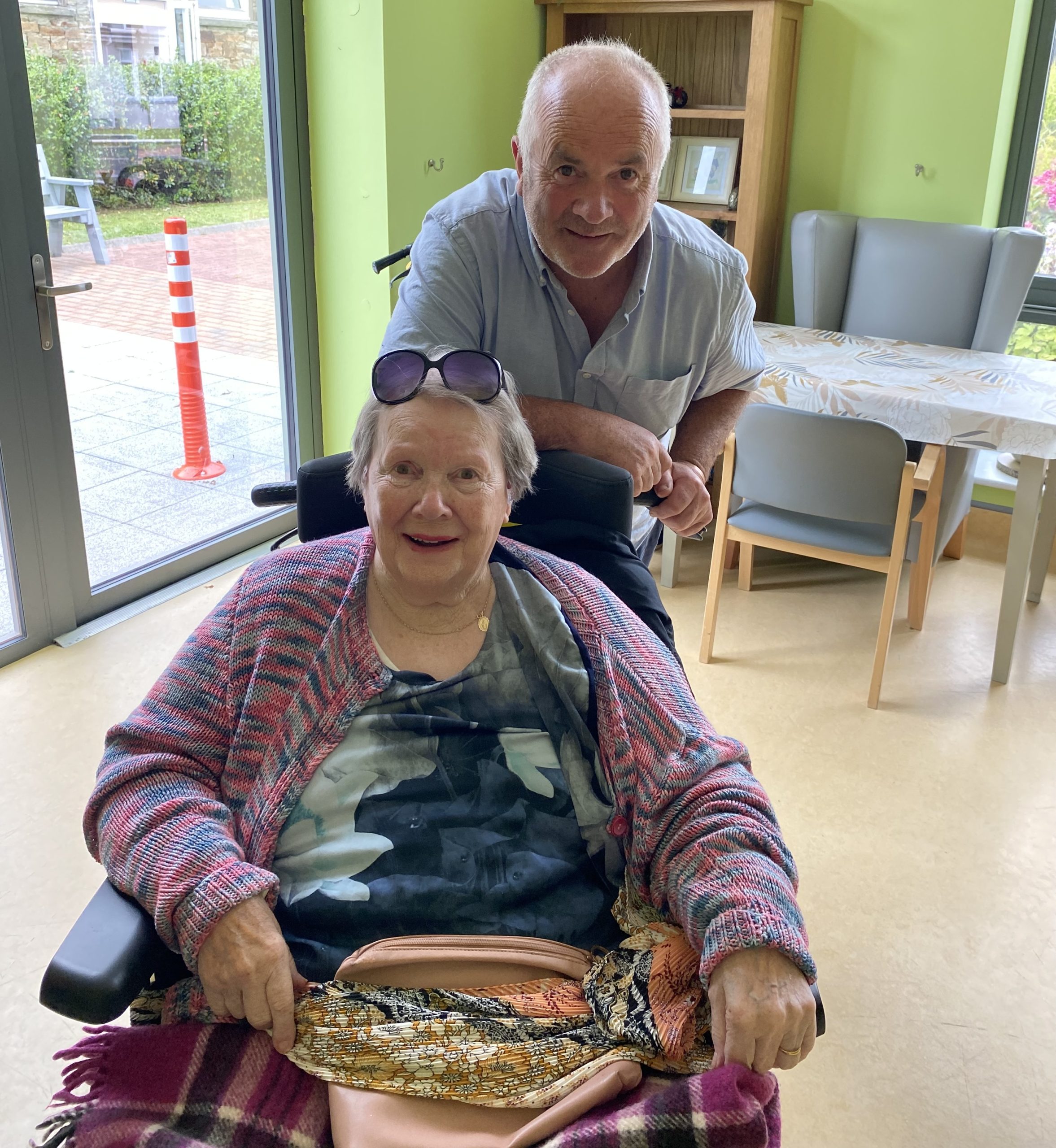
Mrs Daly and her son Peter
Before we said goodbye, we sang one more song, this time together. It was the classic “Wild Mountain Thyme”: “Will you go, lassy, go? / And we’ll all go together / to pluck wild mountain thyme / all around the blooming heather.”
Singing this with Mrs Daly, Lily, and Peter was heartrendingly beautiful for me, a song of departure and togetherness, of poignant longing and wild beauty.
After we hugged Mrs Daly, we walked behind her wheelchair through the hospital. I couldn’t restrain my tears with Peter. I was confused: meeting Mrs Daly again and introducing her to Lily was truly a dream come true after imagining this moment for eighteen years. Now it had finally happened. On top of that, Mrs Daly was still so full of love and told Peter, “This is one of the best days of my life.” It couldn’t have been a more beautiful reunion. And yet, my heart was heavy and filling with grief to the point of tears. I felt an increasingly acute distress that I couldn’t fully understand.
Looking back, I think I knew that I was saying goodbye to Mrs Daly and that, as she alluded, I would never see her again on this earth. Reckoning with that pierced my heart with sadness.
One of the recurring struggles in my faith as a follower of Jesus is the heartbreaking evil in our world — the violence, the cruelty, the unnecessary suffering, the death of children. Mrs Daly embodied the opposite of that evil — a presence of goodness, of enduring kindness, of unconditional love. She lived this kindness even when her own beloved daughter was dying and we added drama to her life amidst a terribly stressful time. Hers was a goodness that I could trust was real.
So the thought of Mrs Daly no longer being physically present on this earth was deeply painful to me. It was almost like a candle was going out in the darkness, a source of light I desperately wanted to remain and remind me that goodness is real, even when my soul is sick, not with alcohol but with evil.
A Call at Night
Late last Tuesday night, Peter called me unexpectedly from Ireland. He told me that his mom was dying. Remembering my tears in the hospital, he said that he couldn’t help but wonder if the Almighty had arranged it for me to see her one last time and for her to meet Lily.
Over the phone, Peter and I cried and laughed and prayed together — in the way that you do when someone dear to your soul is transitioning to heaven. Somehow the tears of deep grief and laughs of pure joy are different expressions of the same love that mysteriously belong to one another. As Mrs Daly said, “It’s love that I cannot describe. It’s the wonderful thing on earth.”
Then Peter called again late the next night. He told me that “Mam,” as he always called his mother, had “made her journey.” She was reunited with her husband Michael, son Cornelius, and daughter Eileen with Jesus in heaven.
After her funeral on Saturday, the former dean of St. Fachtna’s Cathedral, Chris Peters, told me, “As you can imagine, it was massive.” So many people were touched by this soft-spoken, deeply kind, profoundly strong, enduringly loving woman whose work was her prayer.
An Everyday Saint of Love
I am grateful to be among the people Mrs Daly touched with her life. She will likely never be sainted. But for me, she was an everyday saint of love that I could trust. She lived the life I deeply desire but often fear I’m not strong enough to sustain — a life of kindness in sorrow, of love in suffering, of divine presence in the mundane tasks of life, even when people you love are dying.
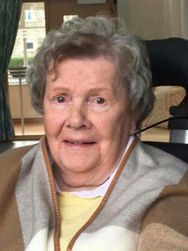
I will deeply miss Margaret née Hurly Daly (May 18, 1936 — October 8, 2025). I trust that her light has not gone out but only grown brighter in heaven. May her love continue to light the way for us who travel the passing darkness of earth until “we all go together.”
My deepest condolences and affection to Peter, John, Norma, Mariam, their families, and all who cherish Margaret Daly. As she said at the hospital with that light of kindness in her eyes, “We’ll meet in heaven if we don’t meet again. There’ll be no crying between us.”
Caed mile failte, now and forever.



